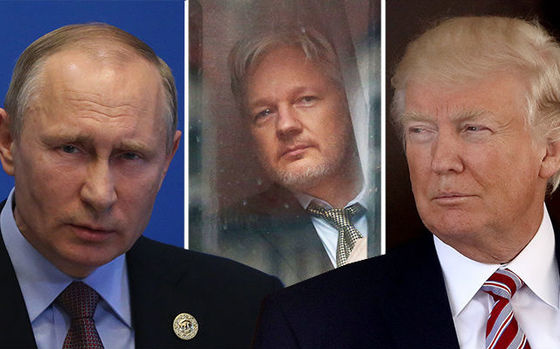R to L: Donald Trump, WikiLeaks founder Julian Assange, and Russian President Vladimir Putin
Testimony in the trial of Roger Stone, an associate of Donald Trump’s 2016 campaign, indicates Trump lied about his knowledge of WikiLeaks’ dissemination of e-mails hacked by Russian officials.
Trump sought the e-mails, stolen from the Democratic National Committee and staff of Democratic nominee Hillary Clinton, to damage his opponent in the election.
Rick Gates, the deputy Trump campaign manager, testified on Tuesday that Trump said to him — after a phone call with Stone on July 31 — that “more information would be coming”.
Trump and Stone spoke as Trump rode to New York City’s La Guardia Airport, nine days after WikiLeaks released thousands of stolen e-mails and four days after Trump publicly called on Russia to find and release 33,000 e-mails that Clinton deleted from a private server.
During the Trump-Russia investigation of Special Counsel Robert Mueller, Trump said in written answers through his attorneys that he recalled no conversations with Stone during the six months before he was elected. He said he did not recall any discussions of WikiLeaks with Stone, or knowledge that campaign aides were talking to Stone about WikiLeaks.
The claim could not be discussed because Trump refused to be interviewed by Mueller’s team.
But Gates said on Tuesday that Stone had told Trump campaign staff “for months” of an imminent WikiLeaks release, prompting meetings about how to react.
Confidence in Stone ebbed as weeks passed. Then the WikiLeaks dumped the documents and the campaign “was in a state of happiness”.
“It was in a way a gift,” Gates said.
Confirming the Trump-WikiLeaks-Russia Connection
Much of Gates’ testimony is in the 448-page Mueller Report, to which the former Trump official gave evidence, said a “person familiar with the report”.
The material is redacted in the report because of ongoing legal proceedings and rules over grand jury evidence.
But open passages in the report set out Trump’s dedication to obtaining Hillary Clinton’s e-mails, including orders to Michael Flynn, who was later National Security Advisor in the Trump Administration.
Flynn told investigators “that Trump made this request repeatedly, and [I] subsequently contacted multiple people in an effort to obtain the emails”.
In the first tranche of Mueller’s notes, released under court order last week, the Special Counsel records Gates’ testimony, “Candidate Trump said, ‘Get the e-mails’”. Flynn said, “He could use his intelligence sources to obtain the e-mails.”
Gates explained:
Donald Trump Jr. would ask where the e-mails were in family meetings. Michael Flynn, [Trump’s son-in-law] Jared Kushner, Manafort, [NAME WITHHELD], [former Trump campaign manager Corey] Lewandowski, [senior Trump advisor Senator] Jeff Sessions, and Sam Clovis expressed interest in obtaining the e-mails as well.
Gates did not say if he knew Russia stole the Democratic documents, but he believed foreign nationals had done the hacking.
See TrumpWatch, Day 1,017: Testimony Confirms Trump Campaign’s Pursuit of E-Mails Stolen by Russia
Stone, a friend of Trump’s for 40 years, is being tried on charges of lying to the House Intelligence Committee as it investigated Russia’s interference in the 2016 election, including the role of WikiLeaks. He is also charged with trying to block the testimony of a witness who would have contradicted his version of events. If convicted, he faces a maximum sentence of 20 years.
Gates pleaded guilty to conspiracy and lying to federal investigators in early 2018 and may be sentenced next month. He cooperated with investigators in their case against his long-time boss, former Trump campaign manager Paul Manafort, who is now serving a 7 1/2-year prison term for financial and lobbying crimes.

